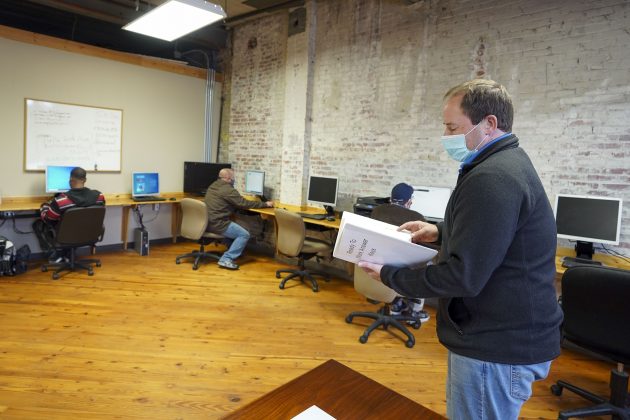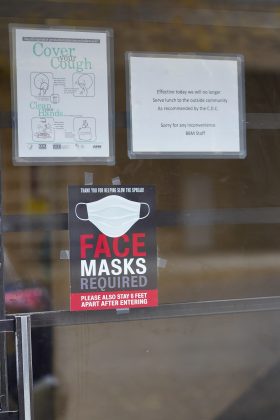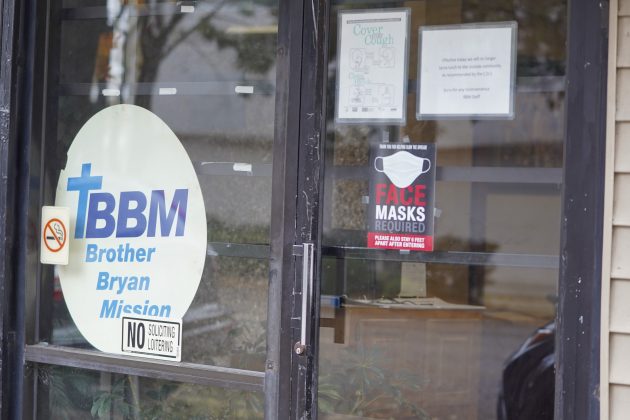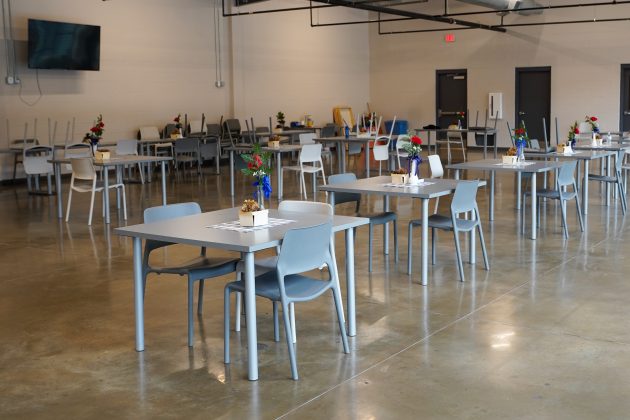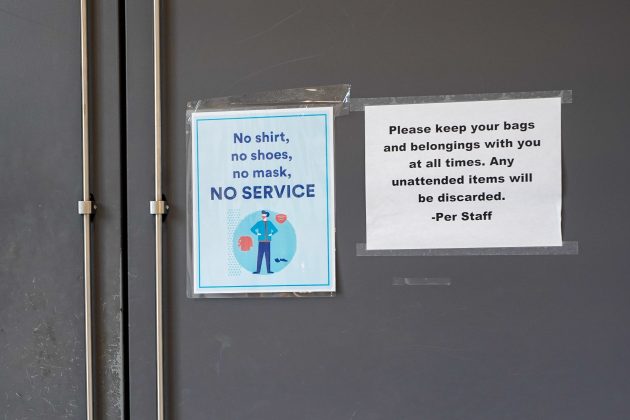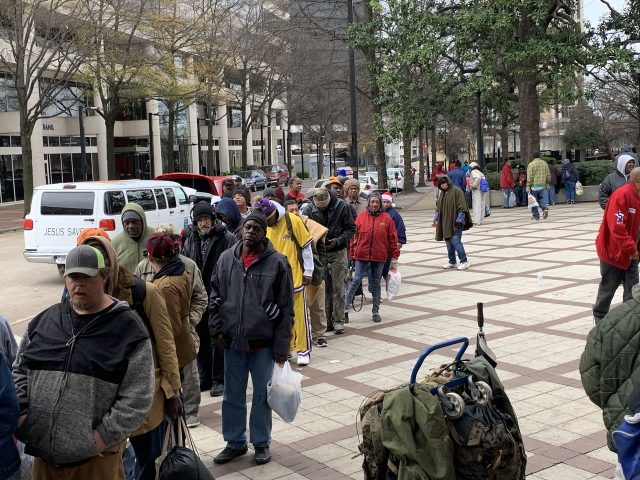
By Sydney Melson and Erica Wright
The Birmingham Times
COVID-19 vaccination sites are opening around Jefferson County, and growing numbers of citizens are receiving shots—but some wonder whether the homeless population is being overlooked.
“It is incredibly important that the homeless population is not forgotten,” said Anne Wright Rygiel, executive director of the Firehouse Ministries, a homeless shelter that has provided services to the Birmingham community since 1983. “This is still congregate living and housing. … We’re all grouped together, and we do the best we can.”
Having a COVID-19 vaccination plan is extremely important for area emergency shelters, said Gordon Sullivan, Director of Operations for One Roof, the umbrella organization for agencies fighting to prevent and end homelessness in the Birmingham metro area. “Even with social distancing and mask wearing, there is still a risk of viral spread among our most vulnerable citizens experiencing homelessness.”
So far, the University of Alabama at Birmingham (UAB) has provided more than 40,000 first- and second-dose vaccines to health care and emergency medical services (EMS) workers, first responders, UAB patients, and community members. In addition, several vaccination sites have opened throughout Jefferson County: UAB’s Highlands area location in January, one at the Hoover Metropolitan Complex on February 2, and another at A.H. Parker High School on February 11.
Sullivan said vaccines need to be made easily accessible for those who are homeless because “drive-thru vaccination events do not work for the populations we serve.”
Wright Rygiel said the homeless population is often the last considered for a lot of necessities, “and it can’t help but feel that it’s the same for this vaccination,” she said.
“A Matter Of Life Or Death”
“Our [homeless population] are very high need,” she said. “We have a lot of people who are discharged directly from the hospital into the shelter, multiple people with stage 4 cancer, and people recovering from surgery, as well as a large elderly population, so the vaccine could be a matter of life or death.”
Still, there may be reason for optimism.
“I’ve had people reach out from the [Jefferson County Department of Health (JCDH)] and One Roof, asking how many vaccines we think that our population and staff will need,” said Wright Rygiel, executive director at Firehouse Ministries since 2011. “I have not heard any sort of firm date, though, nor have I been reassured that we’re on any sort of schedule to get the vaccine. People keep saying we’ll be eligible in March, but we haven’t had confirmation that that will happen as of yet.”
Sullivan said One Roof has been working very closely with the JCDH and Federally Qualified Health Centers to develop a plan for vaccines to be provided onsite at community emergency shelters. Emergency shelters are included in the next phase of Alabama’s vaccine allocation plan. “However, there simply isn’t an adequate vaccine supply at this time,” he said.
Michael Coleman, executive director of the Jimmie Hale Mission near downtown Birmingham, said his organization is “diligent about making sure all of their needs are met, and right now there is no greater need than getting the vaccine,” he said. “Our number-one priority is [homeless] care, and [vaccine] is a number-one priority on that list.”
The COVID-19 pandemic has had a significant impact on the Jimmie Hale Mission, a Christian-based nonprofit shelter for men, women, and children.
“We’ve had a lot of staff members with COVID-19, and we actually lost a staff member at Jessie’s Place, [a homeless shelter for women and children], so it has affected us tremendously,” said Coleman. “We are excited to get the vaccine, but we still understand that even with the vaccine we will still be wearing masks and social distancing. … We’re just monitoring it like everybody else, and we’re excited to move forward in that process as best as we can, but we just know we still have a long road ahead.”
Stanley Dodd, a chaplain for Brother Bryan Mission, a downtown Birmingham shelter that was founded in 1940, is not sure when Brother Bryan might see vaccines.
“We’ve requested 70 to include our staff and all of our residents. We don’t think we’d have 100 percent participation, though. Most of our people would take it, but not all,” he said.
Wright Rygiel agreed with Dodd about some people being skeptical about getting the vaccine and notes that her team is working strenuously to provide information in the lead up to the vaccine being made available to Firehouse Ministries.
“We have not heard a whole lot of people want to jump on the bandwagon to get vaccinated because of fear,” she said. “Historically, our population has not been treated very well by the medical community. We’re working as hard as we can to change that so people will get their vaccination, but we are leaving it up to the individual. We’re not forcing anyone, staff or clients, to receive it; we are just encouraging it.”
COVID-19’s Impact on Shelters
Coleman said he has not seen an unusual uptick in people needing shelter during the COVID-19 pandemic. In fact, it’s almost the opposite.
“The shelter isn’t overwhelmed. People on the streets are scared to death of coming into a shelter and getting COVID-19. They think they are safer out on the streets,” he said.
Even though the numbers have not increased significantly, the shelter has put a number of safety precautions in place, said Coleman, who has been the Jimmie Hale Mission’s executive director since 2019.
“Anyone who submits an application must get a COVID-19 test prove that they’ve been tested,” he said. “When they come in, we quarantine them until the results come back, usually within 48 hours. If they’re positive, which has happened only once, we will quarantine them for 14 days. If they’re not positive, we put them in the population.”
Also, every Jimmie Hale Mission resident and staff member is required to have their temperature taken every day, and the facility constantly monitors for symptoms and reinforces social distancing guidelines.
Dodd at Brother Bryan Mission knows the importance of safety precautions.
“We had a COVID-19 outbreak back in June 2020. There were 26 of us who got sick, including myself. It was unpleasant, but we were fortunate and blessed that no one needed hospitalization,” he said, adding that the facility implemented several changes to ensure resident and staff safety.
“We changed our intake process to accommodate that,” Dodd explained. “Now if we’re going to bring a guy in, we have them quarantine in a separate area at the mission. They get COVID-19 tested and stay in the area until their test comes back negative or they are free from symptoms. Once they do that, they can join the rest of the guys.”
Since then, there have not been any COVID-19 occurrences at the Brother Bryan Mission, a facility that’s dedicated to helping adult men get through addiction and homelessness economically, emotionally, and spiritually.
Some of the shelter’s services have halted due to COVID-19, however.
“One of the things we have done all of the time we’ve been open is we’ve always served a hot meal each weekday to anyone who needed it. We provided meals on Thanksgiving and for Christmas, but we can’t do them regularly. We also had to stop providing showers,” Dodd said.
In addition, reducing the number of beds has been difficult on the community.
“There’s always a need for more beds,” Dodd said. “Not being at full capacity is tough for us, but we need to make those decisions in a smart way. We will rely on other resources in the community if we can. We will refer them to other shelters around the city if we can’t fit them into Brother Bryan. It’s not always easy, and it doesn’t always work the first day, but we will try with everyone.”
At Firehouse Ministries, on-site testing is available, so incoming individuals are quarantined until the test comes back negative or they have been quarantined for 10 days.
“We have not required a negative COVID-19 test to use our overnight facilities. If someone hasn’t had a negative test, they go into quarantine and eat all their meals and receive services away from the rest of the population,” said Wright Rygiel.
At the beginning of the pandemic, the facility’s staff pivoted to ensure that services were being provided to those in need.
“Our space had to be reorganized to protect others from the pandemic because the building is set up for congregated housing,” said Wright Rygiel. “We had housing for youth, women, and families. We also had housing for the working force [to be available for] people who might have to come in at, say, two in the morning. … Much of that turned into quarantine space.”
Firehouse Ministries also worked closely with the JCDH to ensure that social distancing measures were put in place.
“We cut [most of] our volunteers, which we depend a lot on. We did cross-training with our emergency shelter so we could have additional staff on site,” said Wright Rygiel. “We also transitioned some of our services—public feeding, showering, our clothing closet—to make them available outdoors.”


